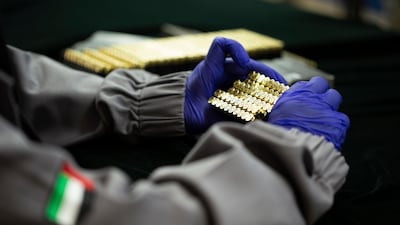One of the biggest defence companies in the Middle East says it will bounce back from Covid-19 with more vigour than ever.
Not only is business at Abu Dhabi's Edge returning to normal, but the company is working on sophisticated new weapons.
Established last year to combine the emirate's defence and technology sectors, Edge encompasses at least 25 companies.
Armoured vehicles, cyber warfare and electronic intelligence systems are just some of its areas of expertise. Many products were on display at last year's Dubai Airshow and Abu Dhabi's Unmanned System Exhibition and Conference.
In exclusive interviews with The National, the leaders of some these companies spoke about how Edge mitigated the effect of the coronavirus, is expanding its global footprint and how the normalisation of ties with Israel brings opportunity.
The challenges of the coronavirus
Like all sectors, defence was hit by the pandemic but now the picture is different.
“We have worked hard to minimise the impact of Covid-19," said Arafat Al Yafei, chief executive of Lahab (Arabic for flame), the UAE’s only ammunition manufacturer.
"Most of the suppliers are from different sectors and all the transportation lines have been impacted by Covid, so delay was there. However, I can assure you that the impact on us was minimal,” Mr Al Yafei said.
Officials said the impact of Covid-19 hit sales by 10 per cent, and with a combined annual revenue of $5 billion, that could mean a lot.
“Covid affected all businesses worldwide and when the cases escalated, our business, like many, came to a standstill. We still see disruptions in our facility but now we have come close to almost normal,” said Abraham DuPlessis, chief executive of Nimr (Arabic for tiger), that makes armoured vehicles.
"There was a period of six weeks to a month where productivity completely stopped. The impact I would say was around 10 per cent,” Mr DuPlessis said.
Edge employs more than 12,000 people and is steadily expanding its network. For example, Halcon in 2019 signed a $1 billion (Dh3.67bn) contract to deliver its Desert Sting-16 precision-guided weapons to the UAE Armed Forces. Edge's Adasi also unveiled the first fully autonomous Emirati-made drone earlier this year. Edge's companies are also exploring new markets, such as Israel.
"From our side wherever there is an opportunity, we are always after it under the guidelines of the government,” Mr Al Yafei said.
Why bullets still matter in world of cyber war
Lahab makes everything from bullets to bombs and meets US military and Nato specifications. Ammunition may be considered an older sector but is there any concern cyberware will make the bullet redundant?
“Cyber threats don’t eliminate the importance of a bullet," Mr Al Yafei said.
"A bullet is important for a weapon to function so I do not see that there is any chance that ammunition or conventional ammunition will be less important in the future."
The latest technology in ammunition involves guided warheads whose main objective is to ensure accuracy.
“You have ammunition that is integrated with guiding systems and with tracking systems – all of these new technologies are being studied and implemented.”
He said that orders are linked to geopolitical situations around the world but that orders for training scenarios are also important.
“At Lahab we are applying the latest technologies. We have a talented workforce and we manufacture full ammunition, from small range up to aircraft bombs. We are very proud to be the only manufacturer of ammunition in the country, which gives us both pride and a sense of responsibility,” he said.
Armoured vehicles made in the UAE
Nimr is the UAE’s leading manufacturer of armoured vehicles.
Exporting to nine countries across the globe, it plans to expand to Malaysia and Indonesia. Some of the vehicles come with an eye-watering price tag of almost $1m.
Its 4x4 and 6x6 vehicles are used in military scenarios and crowd control and, apart from the UAE Armed Forces, Algeria is its biggest customer.
"These vehicles are very expensive," said Mr DuPlessis. "If you compare them to your normal passenger car you would be quite astonished."
The range varies from $300,000 to $900,000 for one vehicle but they can easily last up to 40 years in service. The vehicles are made at a factory on the outskirts of Abu Dhabi.
Every few years the vehicles are stripped down and upgraded to what is almost a brand-new product.
“Our efforts now are in the next generation of vehicles which are the lighter vehicles – the Ajban and the Hafeet,” Mr DuPlessis said.
Nimr is also focusing on driverless cars, which are the next generation of combat vehicles.
“Although we are not developers of these technologies, our vehicles must accept it," said Mr DuPlessis. "We are redoing the whole electronic architecture of all the vehicles to allow us to have a digital platform that is open for third parties to integrate with and to make command and control easier to allow, in the future, driverless vehicles,” he said.
It is clear to see that Edge is forging ahead. Covid-19 is being overcome, but there are other challenges that Edge is confident of meeting.
“Challenge is part of life,” Mr Al Yafei said.
“We have challenges with Covid, we have challenges with keeping the high quality, we have challenges of reducing the cost [and] of the penetration of new markets," he said.
"That is the beauty of life, to have challenges and overcomes those challenges."









